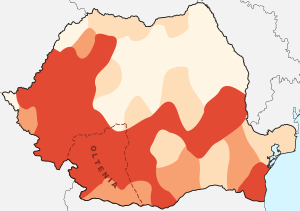Preterite
The preterite or preterit (/ˈprɛtərɪt/ PRET-ər-it; abbreviated PRET or PRT) is a grammatical tense or verb form serving to denote events that took place or were completed in the past; in some languages, such as Spanish, French, and English, it is equivalent to the simple past tense.In Latin, the perfect tense most commonly functions as the preterite, and refers to an action completed in the past.In oral language, the simple past is rarely used except while telling a story; therefore, it would be atypical to hear it in a standard discussion.Simple past is still actively used in current speech in the southwestern part of Romania, especially in Oltenia, but also in Banat, Crișana and Maramureș, mostly in rural areas.Usage of the preterite is very frequent in written narrative discourse, the simple past of the speech verbs being generally after a dialogue line in narration: When used in everyday speech in standard Romanian, the preterite is used with the value of recent past, a recently completed action: The second person is often used in questions about finishing an action in progress that is supposed to be over, giving the question a more informal tone: The forms of the simple perfect are made of an unstressed stem of the infinitive, a stressed suffix that is different in each group of verbs, and the endings -i, -și, -∅, -răm, -răți, -ră,[2] which are the same for all the verbs: In Italian, the preterite is called passato remoto (literally "remote past").This is opposed to the imperfetto tense, which refers to a repeated, continuous, or habitual past action (mangiavo, "I was eating" or "I used to eat") and to the passato prossimo (literally "close past"), which refers to an action completed recently (ho mangiato, "I have eaten").Typical conjugations: Some verbs change the stressed vowel in their preterite root in the third person singular to prevent confusion between it and the first person singular, like dizer (eu disse versus Você/ele/ela desse) and poder (eu pude versus Você/ele/ela pôde).(Traditional Spanish terminology calls all past tenses pretéritos, irrespective of whether they express completed or incomplete actions or events.)The special spellings for the "yo" form of the preterite are listed below (the accent mark goes over the 'e'); these are needed to keep their respective sounds.[6] Typical conjugations with the word sein (be) are: For example, in spoken Upper German (in South Germany, Austria and Switzerland), beyond the auxiliary verbs sein (to be), werden (to become), können (to be able), wollen (to want), haben (to have), the Präteritum is rarely used in the spoken language and informal writing, though the grammatical form is fundamental to producing the subjunctive and conditional forms, while compound verb conjugations are used instead.
Area of use Area of partial use
Area of infrequent use Not used
Historical region of Oltenia highlighted
Preterismabbreviatedgrammatical tensesimple pastperfective aspectperfectpast tenseaoristGermanglossing abbreviationperfectiveparticiplepresent perfectPassé simpleFrenchcontinuoushabitualOlteniaRomanianinfinitiveItalianSardiniansPortugueseimperfectiterative aspectSpanishfirst-personperfective vs. imperfective aspectanomalous stems in the preteriteMexican SpanishGermanic languagesEnglishweak verbsOld Englishsuppletionablautstrong verbirregular verbsauxiliarymodal verbsinterrogativedeclarativeinsertedEnglish verbsUses of English verb formsnarrativeUpper GermanGermanyAustriaSwitzerlandsubjunctiveYiddishPennsylvania GermanAlemannic GermanHighest AlemannicAkkadian languageWest Semitic languageswaw-consecutiveGrammatical aspectOxford University PressZellig HarrisAmerican Oriental Society